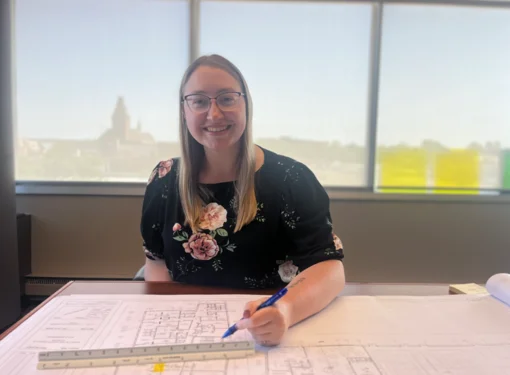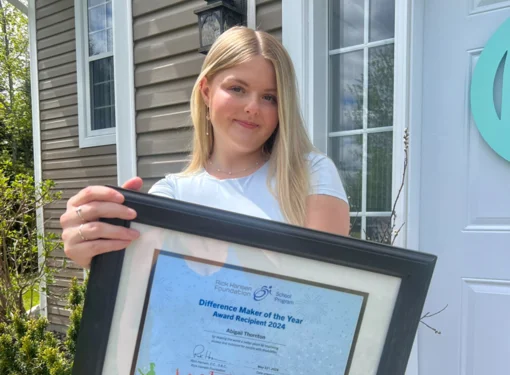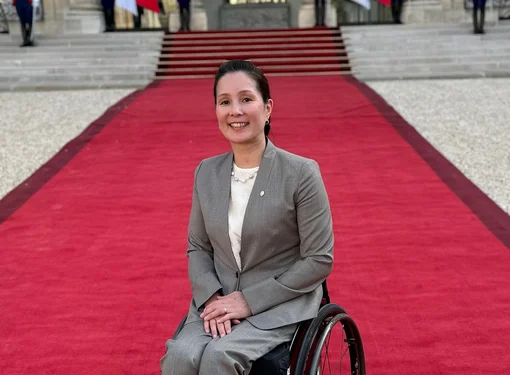Ambassador Spotlight: Meet Jenna Reed-Cote
Instead of playing kickball, Jenna would spend gym class reading Harry Potter in her elementary school’s office. Not bad if you’d rather cast spells with Hermione than shoot hoops, but it can be an isolating experience for someone who already feels different than the rest of the group.
Jenna was born with spina bifida, so she uses the help of a wheelchair to get around. At the time, her teacher thought this meant she couldn’t participate in gym class—while unbeknownst to them she was learning karate from world-class instructors after school. By not taking part in activities with the rest of her schoolmates, she missed out on an important opportunity to play with her peers.
Jenna has accomplished a lot since those days: she’s a social worker; runs Phoenix Attitude, a service to help individuals manage their medical needs; sits on the board of directors of the Spina Bifida and Hydrocephalus Association of BC; volunteers with children and families with medical needs; and is an Ambassador for the Rick Hansen Foundation.
As an RHF Ambassador, she delivers passionate speeches about living with health challenges in school classrooms and assemblies, and does so with a hearty sense of humour. Among other lessons provided in the RHF School Program free resources, teaching both staff and students about disabilities helps ensure that no child will be told they can’t participate just because they appear different than their friend.

Inclusion is about Creativity
Jenna will be the first to say that the gym teacher who sent her to the office wasn’t a bad person—they were just seeing the disability instead of the ability. This is why awareness and education are so important: one small barrier, like not being able to run or use the stairs, can be the root of assumptions.
In her presentation, Jenna will ask students: “If we’re both in a race, and you run the race and I wheel the race, and we both finish the race, was one of us more effective at doing the race because we did it differently?” As a result of the challenges she’s faced, Jenna has become a master of outside-the-box thinking, and she encourages kids to think more creatively. If students learn to find creative solutions and prioritize inclusion, they probably wouldn’t let a friend in a wheelchair miss out on gym class. They’d find a way to make it work—or better yet, invent a new sport entirely.
Challenging students to discover new ways of doing things and innovative solutions to problems will help them become more resilient when they inevitably face barriers in their own lives.
“It’s about seeing that just because it’s done differently doesn’t mean you’re any less successful or able to achieve; it’s more about practicing listening to your gut and figuring out what works for you in order to persevere,” says Jenna.

Empowering Youth to be their own Role Models
Whether they have physical challenges or not, Jenna helps students realize they are more powerful than they think they are. “Kids often think that making accessibility happen is an adult’s job because it requires money to put an elevator in or build a ramp, and so they think maybe they’re being patronized when we say ‘you can make a difference too’ but we need to have these conversations to show them that they really can.”
She says that once you start teaching kids about accessibility and showing them the little things they can do, they begin to think about ways they can work together. Her presentations show young people that challenges are not a bad thing, that a setback can be turned into a comeback, and their age or ability have nothing to do with what they’re capable of. “…By doing that, you’re being your own role model, and becoming a role model for other people.”
Young students sit unusually still when they listen to Jenna speak. When you see them shoot their hands into the air to ask questions and race to meet her after the presentation, it becomes clear her message has been heard. By the end, the classroom is suddenly filled with a generation of positive role models.






